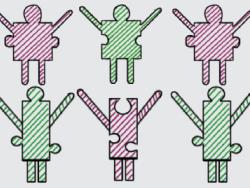Call to sign LGBTIQ affirmation to feminist principles

30 June 2021 - An international alliance of LGBTIQ organizations has drafted a “feminist affirmation letter” in which they affirm their belief that the fight against homophobia and transphobia is rooted in combating patriarchy and hetero sexism. GALE signed the declaration and adopted it as a lead for its gender policy. GALE heartily supports the call for other organizations to sign the affirmation letter.
Human rights for all
The affirmation reinforces and defends the place that trans, intersex and nonbinary people have alongside many others in feminist movements. It underscores the recognition that human rights do not distinguish between persons, they are, in their construction, universal, indivisible and inalienable. In this way, it affirms that the realization of the human rights of any one group of persons does not come at the cost of the rights of any others. These shared principles and values have united diverse feminist movements everywhere.
Eight feminist core principles
The affirmation lists eight core feminist principles:
- Human rights are valid for all people. LGBTI people have the same human rights as any other people, and other people cannot infringe on these rights.
- The right to make own choices and express identities. Sex work is work. Safe abortion is a right. Intersex and trans people should decide about their own bodies. Each person has the right to choose their own gender identity. All consenting adults should be able to choose their own partners. People should not be forced to change their sexual orientation. Adolescents should be recognized as developing adults who are in the process to make their own decisions.
- Freedom from torture and abuse. The affirmation rejects that normal people can torture or abuse other people to change their bodies or deny them access to health. Intersex babies should not be operated on unnecessarily. Trans people want affirmative counseling should be able to get that. Healthcare should be available for all and not withheld because it is privatized or offered by prejudice people.
- The rights of the child. All children should be free from violence, have rights and should be informed about their rights. They should be treated with dignity and their well-being should be secured. Intersex children should not be operated upon without their consent. LGBTIQ children should be protected against discrimination and bullying, and enjoy a safe and welcoming environment. Schools should offer transformative comprehensive sexuality education which includes that gender is a social construct, not a natural or God-given order of things. LGBTI families should be recognized and protected.
- Sex, gender and sexuality are constructs. A core feminist belief is that gender and sexuality are constructed categories of identity, like other categories such as race, class and caste. These constructs are used to maintain power imbalances. The primitive idea that gender is natural and God-given is incorrect and harmful for cisgender people but especially for LGBTIQ people. It produces horrible stereotypes, limiting gender roles, and a series of norms that lead to overall gender inequality. The affirmation takes a firm stand against these effects and especially against the delegitimization of trans, gender-diverse and intersex people.
- Intersectionality. Individuals and groups face varying degrees of discrimination or disadvantages depending on intersecting structures of oppression. Social classifications such as race, age, sex, gender, sexual orientation, gender identity and expression, sex characteristics, and other statuses are woven into each other. Simplifying the world by only focusing on one of these disadvantages will implicitly work out negatively for people were disadvantaged because of other classifications. There is no common human experience, including in the experience of gender.
- Self-determination. Colonization is not only the occupation of territories by other powers. It is also imposing certain views on the cultures and bodies of others. This takes away people’s own choices. The affirmation rejects such oppressive systems that take away self-determination.
- Challenging unjust power structures. In traditional systems, but even in human rights legislation, unjust power structures still exist and privilege men over women, straight people over LGB people, white people over black people and able people over disabled people. The LGBTIQ movement should challenge all these structures, in society but also within our own movements.
Sources: feministaffirmation.org, The AFFIRMATION OF FEMINIST PRINCIPLES


